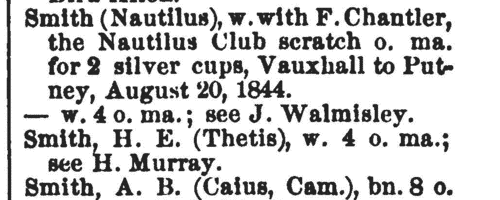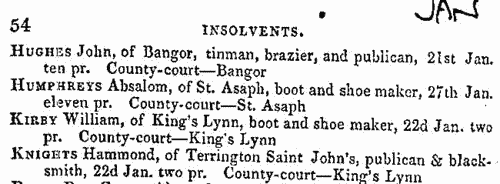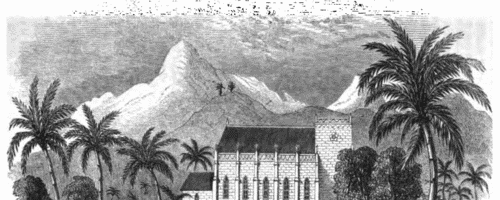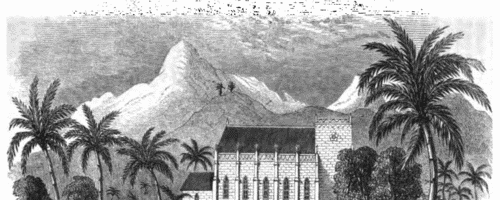Attfield Surname Ancestry ResultsOur indexes 1845-1865 include entries for the spelling 'attfield'. In the period you have requested, we have the following 22 records (displaying 1 to 10): Single Surname Subscription | | | Buying all 22 results of this search individually would cost £116.00. But you can have free access to all 22 records for a year, to view, to save and print, for £100. Save £16.00. More... |
These sample scans are from the original record. You will get scans of the full pages or articles where the surname you searched for has been found. Your web browser may prevent the sample windows from opening; in this case please change your browser settings to allow pop-up windows from this site. Gentlemen amateur rowers
(1835-1851)
Rowing was one of the English sports covered in detail in the pages of Bell's Life in London, and from these was compiled a compendium called the Aquatic Oracle. The text is divided into two main parts: Gentlemen Amateurs and Watermen. All the entries are cross-referenced, and use these abbreviations: w., won; l., lost; b., beat; bn., beaten; sc. ma., scullers' match; o. ma., oars match; do. sc. ma., double scullers' match; 4 o.ma., 4 oars match; 8 o. ma., 8 oars match; sk., stroke; cox., coxswain; as., a side; Oxon., Oxonian; V. to P., Vauxhall to Putney; W. to P., Westminster to Putney; P. to M., Putney to Mortlake; M. to P., Mortlake to Putney; dis., distance.ATTFIELD. Cost: £6.00.  | Sample scan, click to enlarge

|  Inhabitants of Newington in Surrey
(1851) Inhabitants of Newington in Surrey
(1851)
The 1851 census return for St Mary Newington, Surrey, registration district: St Peter Walworth sub-district: enumeration district 2: described as: "All that Part of the Parish of St. Mary Newington, which Comprises Both sides of the Lorrimore Road, Bridge Cottages, Bridge Place, West St. (south side), Including Cottage Grove, West side of Walworth Road from West St to Carter St., Carter St. (both sides) including Walworth House". This area lay in the ecclesiastical district of St Peter Walworth, and in the borough of Lambeth. The addresses listed in the actual returns are 1 to 8 Octavius Terrace; 1 to 7 Sutherland Terrace; 2 and 4 St Georges Terrace; 1 and 7 to 11 Onslow Terrace; 2 to 8 Margaret Terrace; cottages on Lorrimore Road (including Ivey Cottage and Flora Cottage); 1 to 11 Anns Terrace; 1 to 5 Bridge Cottages; 1 to 3 Bridge Place; Field Cottage, Edina Cottage, Sylvan Cottage and Grove Cottage in West Street; 1 to 9 Cottage Grove; Harford Cottage, West Street; 2 to 10 Cottage Place; Elizabeth Cottage, West Street; 1 to 11 West Street; 1 to 17 Keens Row; 1 to 43 Carter Street; and Walworth House. HO 107/1567ATTFIELD. Cost: £4.00.  | Sample scan, click to enlarge

| Insolvents in England and Wales
(1851)
Perry's Bankrupt and Insolvent Gazette, issued monthly, included lists of insolvencies and stages in the process whereby the insolvents petitioned for release from debtors' prison. The insolvent is generally referred to by name (surname first), address and trade. This is the index to the names of the insolvents, from the issues from January to December 1851.ATTFIELD. Cost: £6.00.  | Sample scan, click to enlarge

|  Residents of Kennington: Vassall Road (1851) Residents of Kennington: Vassall Road (1851)
In the 1851 census, Lambeth superintendent registrar's district, Kennington 2nd registrar's district, enumeration district 1 lay in Kennington St Mark's ecclesiastical district and in the borough of Lambeth. HO 107/1574
ATTFIELD. Cost: £4.00.  | Sample scan, click to enlarge

| Traders and professionals in London
(1851)
The Post Office London Directory for 1851 includes this 'Commercial and Professional Directory', recording about 80,000 individuals. ATTFIELD. Cost: £4.00.  | Sample scan, click to enlarge

| Bankrupts' Estates
(1854)
Transfers of bankrupts' estates in England and Wales to assigneesATTFIELD. Cost: £6.00.  | Sample scan, click to enlarge

| Insolvents
(1854)
Insolvency notices for England and Wales: insolvency often caused people to restart their lives elsewhere, so these are an important source for lost linksATTFIELD. Cost: £6.00.  | Sample scan, click to enlarge

| Missionary donations from Hertfordshire
(1855)
The Congregational and a number of other independent churches together formed the Evangelical Alliance, committed to promoting and supporting missions to the heathen. The areas chosen for their projects were Guiana, South Africa, India, the South Seas and China. The work of the missionaries was not only in preaching the Gospel, but also in translating the Bible into local languages, and establishing churches, schools and orphanages. Orphans and native teachers were often given the names of principal contributors or congregations back in Britain. In Britain the large amounts of money needed for this work were raised among the Congregational and independent congregations, arranged by auxiliaries for each county (although some contributions for each county might in fact come in from congregations and individuals in neighbouring areas); money was gathered by ministers, at special services, by supporters, and in missionary boxes. The accounts of all these contributions were published as part of a monthly magazine called the Evangelical Magazine. Each issue of the magazine carried obituaries of prominent members of the congregations; general articles on religion; reviews of newly-published religious books; home news, mainly about meetings of importance or interest by the alliance or in individual churches; and then a separate section called the Missionary Chronicle. The Missionary Chronicle was devoted to letters and reports from the missionaries; and concludes with a set of accounts of donations towards the missionary work. This is the index to the donations reported in the magazine, January to December 1855, from Hertfordshire.ATTFIELD. Cost: £6.00.  | Sample scan, click to enlarge

| Missionary donations from London
(1855)
The Congregational and a number of other independent churches together formed the Evangelical Alliance, committed to promoting and supporting missions to the heathen. The areas chosen for their projects were Guiana, South Africa, India, the South Seas and China. The work of the missionaries was not only in preaching the Gospel, but also in translating the Bible into local languages, and establishing churches, schools and orphanages. Orphans and native teachers were often given the names of principal contributors or congregations back in Britain. In Britain the large amounts of money needed for this work were raised among the Congregational and independent congregations, arranged by auxiliaries for each county (although some contributions for each county might in fact come in from congregations and individuals in neighbouring areas); money was gathered by ministers, at special services, by supporters, and in missionary boxes. The accounts of all these contributions were published as part of a monthly magazine called the Evangelical Magazine. Each issue of the magazine carried obituaries of prominent members of the congregations; general articles on religion; reviews of newly-published religious books; home news, mainly about meetings of importance or interest by the alliance or in individual churches; and then a separate section called the Missionary Chronicle. The Missionary Chronicle was devoted to letters and reports from the missionaries; and concludes with a set of accounts of donations towards the missionary work. This is the index to the donations reported in the magazine, January to December 1855, from London.ATTFIELD. Cost: £6.00.  | Sample scan, click to enlarge

|  Sailors and marines on H. M. S. Spitfire in the Crimean War
(1854-1856) Sailors and marines on H. M. S. Spitfire in the Crimean War
(1854-1856)
Sebastopol in the Crimea was the great Russian naval arsenal on the Black Sea. A combined assault by British, French and Turkish troops resulted in the reduction of Sebastopol and led to the Treaty of Paris of 27 April 1856, guaranteeing the independence of the Ottoman Empire. By Admiralty Order the Crimea Medal was awarded to sailors and marines present during the campaign, between 17 September 1854 (the first landing at Eupatoria) and 9 September 1855 (when the allies secured Sebastopol). The sailors' medals were mostly delivered to them on board ship in the course of 1856; the marines' medals were sent to their respective headquarters for distribution. The remarks as to distribution in this medal roll therefore give more specific information as to the whereabouts of the sailor recipients in 1856 than about the marines. Her Majesty's Ship Spitfire, a 5-gun steam vessel, took part in the assault. Four clasps to this medal were awarded to the men present in the actions at Sebastopol itself, Inkerman, Balaklave (Balaclava) and (the sea of) Azoff, but the recipients of these clasps are recorded on separate rolls, not part of this index, but indexed on this site.ATTFIELD. Cost: £8.00.  | Sample scan, click to enlarge

|
Research your ancestry, family history, genealogy and one-name study by direct access to original records and archives indexed by surname.
|













